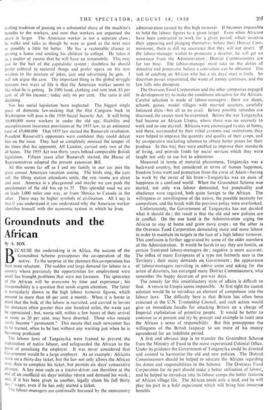Groundnuts and the African
By A. FOX The labour laws of Tanganyika were framed to prevent the exploitation of native labour, and safeguarded the African to the point of penalising the employer. It was never considered that Government would be a large employer. As an example: Africans work on a thirty-day ticket, but the law not only allows the African sixty days to complete his ticket, but permits six days' consecutive absence. A key man such as a tractor-driver can therefore at the end of an unofficial six days' holiday return and demand his work ; and, if it has been given to another, legally claim his full thirty days' wages, even if he has only started a ticket.
The labour-managers are continually harassed by the unnecessary administration caused by this high turnover. It becomes impossible to hold the labour figures to a given target. Even when Africans have been contracted to work for a given period, which involves their appearing and pledging themselves before their District Com- missioner, there is still no assurance that they will not desert. If the labour-manager wishes to prosecute a deserter, he will get no assistance from the Administration ; District Commissioners are far too busy. The labour-manager must take on the duties of detective and prosecutor before a conviction can be obtained. The task of catching an African who has a six days' start is futile. So desertion passes unpunished, the waste of money continues, and the law falls into disrepute. The Overseas Food Corporation and the other companies engaged' in development try to make the conditions attractive for the African. Careful selection is made of labour-managers ; there are shops, schools, games, model villages with married quarters, carefully balanced diets—but all to no avail. Before possible remedies are discussed, the causes must be examined. Before the war Tanganyika had become an African Utopia, where there was no necessity to work and no one starved. Africans were encouraged to stay at home, and there. surrounded by their tribal customs and institutions, they were helped to improve the quantity and quality of their crops, and by co-operative marketing schemes to obtain better -prices for their produce. In this way they were enabled to improve their standards of living, and provide funds for social services which they were taught not only to use but to administer. .
Measured in terms of material phenomena, Tanganyika was a backward country, but considered in terms of human happiness, freedom from want and protection from the curse of Adam—having to work by the sweat of his brow—Tanganyika was an oasis of happiness in a confused world. When the Groundnut Scheme was started, not only was labour demanded, but punctuality and obedience were required, both quite foreign to the African. The willingness or unwillingness of the native, the possible necessity for compulsion, and the break with the previous policy were overlooked.
Unfortunately, the Government of Tanganyika has not decided what it should do ; the result is that the old and new policies are in conflict. On the one hand is the Administration urging the African to stay at home and grow more crops ; on the other is the Overseas Food Corporation demanding more and more labour in order to maintain its targets in the face of a high labour turnover. This confusion is further aggravated by some of the older members of the Administration. It would be harsh to say they are hostile, as certain frustrated labour-managers do ; negative is more accurate. The influx of many Europeans of a type not formerly seen in the Territory ; their many demands on Government ; the appearance of labour-managers recruiting in native areas and asking for the arrest of deserters, has estranged many District Commissioners, who remember the happy decorum of pre-war days.
The remedy for this unsatisfactory state of affairs is difficult to find. A return to Utopia seems impossible. At first sight the easiest solution would be to introduce an element of compulsion into the labour laws. The difficulty here is that Britain has often been criticised at the U.N. Trusteeship Council, and such action would give an immediate handle for attacking Britain on a charge of Imperial exploitation of primitive people. It would be better to continue as at present and try by precept and example to instil into the African a sense of responsibility. But this presupposes the willingness of the British taxpayer to see more of his money squandered for an indefinite period.
A first and obvious step is to transfer the Groundnut Scheme from the Ministry of Food to the more experienced Colonial Office. Under its guidance the Government of Tanganyika could be directed and assisted to harmonise the old and new policies. The District Commissioners should be helped to educate the African regarding his duties and responsibilities in the Scheme. The Overseas Food Corporation for its part should make a better utilisation of labour, and be helped to introduce into its labour camps the better features of African village life. The African needs only a lead, and he wilt play his part in a bold experiment which will bring him immense benefits.


































 Previous page
Previous page